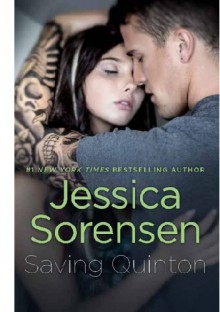
Initial reaction: One of the few times I picked up a book where it started off terrible and cliche, but the progression really grew from where it started. I liked it, but I have some bones to pick with the narrative. This review might run a little long, for constructive and personal feedback.
Full review:
This is the last time you say,
After the last line you break,
It's not even a holiday,
Nothing to celebrate.
You give a hundred reasons why,
And you say you're really gonna try.
If I had a nickel for everytime,
I'd own the bank.
Thought that I was the exception,
I could have rewrite your addiction,
You could've been the greatest,
But you'd rather get wasted.
You fall asleep during foreplay,
'Cause the pills you take, are more your forte.
I'm not sticking around to watch you go down.
Wanna be your lover, not your fucking' mother.
Can't be your savior, I don't have the power.
I'm not gonna stay and watch you circle the drain,
Watch you circle the drain,
Watch you circle the drain.
-lyrics from "Circle the Drain" by Katy Perry
I start this review off by quoting these specific set of lyrics because this was the one song that played through my mind after reading this book. It's a pretty powerful statement since this book is pretty heavy for its subject matter - tackling drugs, depression, death (including suicide and survivor's guilt) among other matters.
I'll be blunt starting this discussion/reflection: Sorensen's previous narratives have not impressed me, because many times, I had issues not only with the way certain issues were portrayed, but the writing was just so underwhelming, lacking quite a bit of character intimacy and an eye for detail and reflective insight (plus...cliches. Many, many cliches). There were more moments of telling versus showing, and quite a few of the series I started from her I had to stop because of the very cheap cliffhangers that she would usually use to break into the next installment of a series.
"Breaking Nova" is a bit of a departure from that trend (and seriously, thank goodness for that), but it's still extremely flawed for a narrative. I'll admit I had a hard time getting into this novel to start. The writing in the beginning was very underwhelming with its tell-all format, and it felt like there was a mismatch between the very heavy ordeals the characters endured and how the presentation came across. Quinton and Nova are palpable characters, they're young and naive, marred by tragedy. Nova's boyfriend commits suicide, leaving Nova herself grappling with depression as well as obsessive compulsive disorder. Quinton has survivor's guilt after being the person at the wheel that killed his girlfriend and another friend. He pretty much is a dead man revived and walking, lost to the lust of drugs and addiction.
This is not an easy narrative to read, two-fold on the note. On one hand, I really liked the realistic and blunt way this narrative is told between Nova and Quinton's characters. It made them more dimensional and you get the impression that they are not perfect characters. However, I did not like the way the narrative seemed to beat me over the head with some of the ideals intended. Yes, we know these characters are not perfect or "good" - and the narrative spent far too much time dwelling on this fact. I did love that Nova spent a lot of time searching for some mark of herself through this novel, despite her grief. She showed a lot of growth from the time she started in this novel to the endpoint, where she came to terms with things. I rarely see this kind of growth in NA novels - seriously, this genre needs to pick itself off its bootscraps and do more of this. Show its characters coming to terms with their grief in realistic ways and moving away from things that may tempt or make them lost or what have you. Added to handling it with the kind of maturity that it deserves. Because that's life - that's real, that's the kind of thing I like to see in contemporary narratives with handling this kind of tough subject matter. It makes it more mature and identifiable, even when the characters do things that the reader may not like or agree with.
But, I'm not happy about the cliches and misinterpretations of issues here. This doesn't completely depart from the usual slut shaming/bitch slamming, melodramatic meandering that I usually see in the genre. And that sucks really, because I don't know if this narrative really needed all that to tell its respective story, and it probably could've even been more powerful without it. Some of it I could accept for realism, but I think there was just a bit too much focus with that here (not as much as other narratives I've read, but enough to where it was a problem).
Let's also establish something right now about the way this book handles depression/anxiety/OCD/mental illness/addiction. Some parts of it are amazingly well presented, especially with respect to Nova coping with her boyfriend's suicide, her father's death, her own suicide attempt, and other measures where she's in her own head and succumbs to habit and anxieties she can't control. Even Quinton's survivor's guilt has value and identifiable traits, and his spiral into the use and abuse of drugs is very realistic given the pain he feels. The narrative doesn't sugarcoat it, which is something I respected when it was done well.
But here are the things I didn't like:
1. Depression is not just "sadness." Please stop perpetuating this myth. I didn't understand why this was repeated through the narrative as much as it was, and it played right into the hand of the cliche/assumption and it's wrong. Every other line seemed like something about the other characters observing Quinton and Nova looking "sad" or "depressed" or "like shit" and I was like "Dude, STOP. This is not the way to emphasize this."
And it's a shame, because there are moments when Sorensen hits the nail on the head for the experience and how the characters come to terms (well, at least Nova's case, because even by the end of this book, Quinton's still struggling, and at least those portrayals were realistic and not some magical sex/love cure-all B.S. that tend to pepper NA narratives pervasively.) I liked the fact that Nova got into making films and revealing her raw struggles and grief. I liked that Quinton's descent into drugs was realistic. There were moments where I worried the narrative would glorify his use and abuse, but it's shown to be a problem and a spiral that consumes his life (and almost consumes Nova as well.)
2. Too much crying. I understand the grieving process, and I even embrace the fact that this narrative shows both its male and female characters grieving during crucial and critical moments where they're emotionally overworked/overwhelmed by their experiences. But it was a bit too much in this, man. It felt like it was repeated (and really, that was a big flaw in this collective narrative: repetition where there didn't need to be repetition).
3. The realistic portrayal of OCD was very limited here. Yes, it was mentioned the character suffers from compulsive habits, and there are points where Nova's anxieties have an intimate exploration. But instead of being told this information and repeated continously, I would've liked to see more how she actually deals with this. It could've even been valuable to see her in therapeutic settings (since it was mentioned she did see a therapist). I almost would've liked it if Sorensen did something similar to what E. Lockhart did with the Ruby Oliver series, in that it showed how Ruby suffered from panic attacks, what triggered them and how she was able to overcome that. While this is NA, and I understand there were other issues here to be explored for the narrative constraints - it would've been far better to use that time to develop and show this rather than just spending the time in the telling repetition it chose to go with. I would've valued Nova's character even more with that, because at least - from the perspective of someone who doesn't have that particular condition - I would've been able to see more of Nova's experiences.
This isn't so much a romance novel as it is a realistic fiction/tough subject work in contemporary terms, but I thought the narrative did a decent job of showing the connections between Nova and Quinton, even when there were matters that created tension between them. And while these characters had a lot of growing up to do, at least this narrative really made it palpable after a time.
I'm likely to follow this series to see where it goes, and I hope that Sorensen's narrative improves upon the point where this series started. There are some moments of good standing here, but it's almost undermined by the fact that Sorensen chooses to repeat measures that don't need the repetition or telling, and undermined by the cliches and misinterpretations/juvenile portrayals of heavy subjects that often pepper other narratives in this genre. But I am glad there were at least moments in this where it went away from the box of complete instalust or just trainwreck relationships for the sake of the trainwreck. It actually meant something, and I fully appreciated Sorensen's dedication in the beginning which addressed this book to anyone who's ever felt "lost." I've been there personally in moments in my life, and while I couldn't identify with any of the characters directly for their experiences (understatement), at least there were moments in this novel where I could say "Yeah, this conveys the measure of losing your way and place in the world, but there's potential to be able to get back up again, regardless of how far you fall."
Overall score: 3/5 stars
Note: I received this as an ARC from NetGalley, from the publisher.


 Log in with Facebook
Log in with Facebook 









